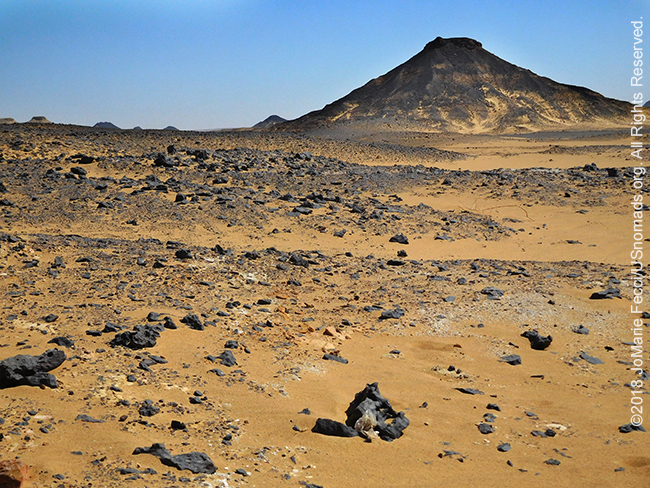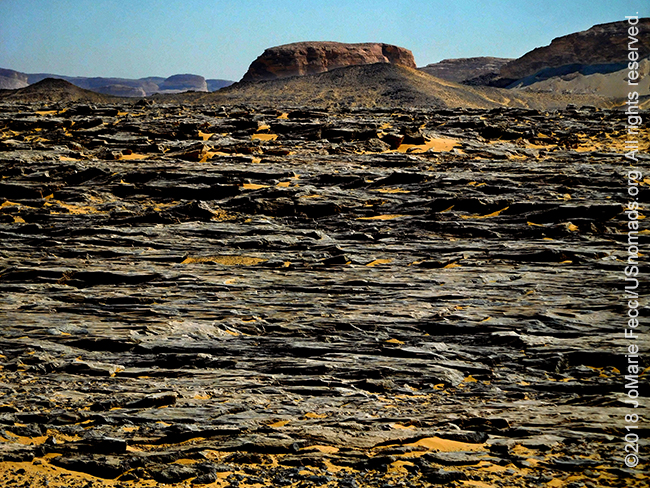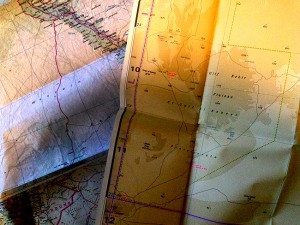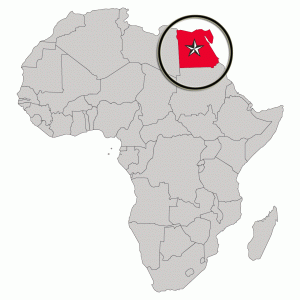
WESTERN DESERT, EGYPT (31 March 2018) — The Black Desert had a familiar look to me. It reminded me of some of the landscapes we drove through in the Algerian Sahara. What looks like black volcanic rock piled up or crumbling down creates a surreal landscape and erosion does its work turning the black rocks into fine black sand, covering and blending with the more familiar golden shades.
It was an easy drive from Bawiti back on the highway for a few kilometers before just turning onto an anonymous dirt track heading towards some dark hills in the distance. The mixture of black and gold was striking and I was excited to get deeper into it’s mysteries.
I am now traveling with my Bahariya-based team and we have a solid and well-prepped 1997 Toyota Land Cruiser. Abdou and Ahmed are from Bahariya and grew up with this desert. They know it well, yet Abdou explained to me that there are parts of it they only got to know when the area around the oasis became “interesting” for foreigners. As kids they had never really played or explored in the more desolate spots.
The families of the oasis have been settled for many generations and before tourism and the iron mines gave a boost to their economy, the main livelihood was farming and date palms. Abdou said that maybe his great grandparents or great-great grandparents might’ve remembered a time when caravans still passed this way, but there aren’t any Bedouin nomads in this part of the desert now. And yet the tradition of Bedouin hospitality remained strong.
Driving further into the Black Desert there were some places that looked so harsh and unforgiving I couldn’t imagine that anyone or anything could live there. It had been described as “a landscape straight out of Hades,” but I found it beautiful. And it held some mysteries and surprises.
Walking along one of the more black rock plateaus, Abdou picked up a small strangely shaped black rock. He explained that some years ago this area would be full of people collecting them, as it was said that they fell from space. I am not sure if that meant the starburst-formed rocks were actually bits of meteorites or something else. I thought they might be some kind of oddly eroded lava. Abdou said he didn’t know, but that he doubted they were really extraterrestrial. In the end, it didn’t matter, finding them was still a bit magical…

ABOUT THE EXPEDITION

JoMarie Fecci, of USnomads, sets off on an independent scouting trip across Egypt and Sudan in preparation for an up-coming Sahara expedition. Driving locally-sourced Toyotas and working with small local teams in each region, she will traverse a winding route that jumps off from key points along the Nile as far south as Khartoum, where the Blue and White Niles meet. During the journey she will visit a series of UNESCO world heritage sites focused on the ancient civilizations that occupied the region and meet with local communities. The primary goal of this mission is to assess terrain, security, driving conditions, logistical concerns and approximate timeframes for future travel.
WHERE WE ARE

The Arab Republic of Egypt, is a transcontinental country spanning the northeast corner of Africa and southwest corner of Asia by a land bridge formed by the Sinai Peninsula. With the Mediterranean sea on its northern border, the Gulf of Aqaba to the east, and the Red Sea to the east and south, it occupies a geo-strategic location connecting Europe, Asia and Africa. It has land borders with Gaza and Israel to the east, Sudan to the south, and Libya to the west. Islam is the official religion and Arabic the official language. Egypt is the most populous country in North Africa and the Arab world, with over 95 million inhabitants. Most of the population lives near the banks of the Nile River, in an area of about 40,000 square kilometres (15,000 sq mi), where the only arable land is found. The large regions of the Sahara desert, which constitute most of the country’s territory, are sparsely inhabited. Considered a cradle of civilization, Egypt emerged as one of the world’s first nation states in the tenth millennium BC and iconic monuments such as the Giza Necropolis and its Great Sphinx, as well the ruins of Memphis, Thebes, Karnak, and the Valley of the Kings, reflect this legacy.